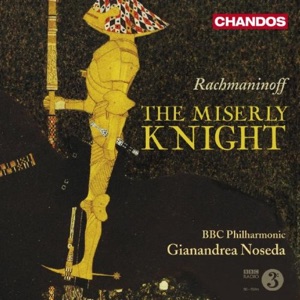Cheerless, philosophically dark, and devoid of hummable tunes (despite using Leitmotifs), Rachmaninov’s early The Miserly Knight (based on a story by that merrymaker, Pushkin) nonetheless must make an impressive effect over its brief one-hour length when staged. Orchestrally rich, if not rewarding, it is more to be admired than liked, and this performance is nothing if not admirable. In three scenes we get nothing but greed, suggested murder (a Jewish moneylender tells the Baron’s son that one way to get the Baron’s money would be to kill him–let’s skip over the rabid anti-Semitism), insults, a duel that doesn’t happen, and an apoplectic death. With only five singers–all male, mostly dark-voiced (save for the mockable Jew)–the action moves fast, and while nothing is quite an “aria”, there is, particularly for the Baron, in his solo, central, 22-minute scene, a sort of mini-opera unto itself.
Despite all criticisms, the characters are well-drawn in such a short period of time that it’s hard not to be fascinated by what’s going on: In Scene 1 we learn that the Baron’s son, Albert, wants his father’s money; Scene 2 gives us a portrait of the miserly Baron, happy only when he’s in the castle crypt, adding to his hoard of gold, disinterested in how it was earned; and in the last scene Albert asks the Duke to intervene with his father on his behalf. Albert hides and overhears the Baron telling the Duke that Albert might murder him, after which he emerges angrily and his father challenges him to a duel. He accepts, the Duke orders him to leave, and the Baron drops dead, thinking of his gold. The final moments will remind listeners of Tchaikovsky.
Ildar Abdrazakov’s Baron is a nasty portrait, snarling, self-involved, perpetually sneering. Terrific, in fact. Misha Didyk’s Albert is strongly sung–he may be a good-for-nothing, but he’s a potent one. Contrasting well with his tenor is the Jew’s more slyly cajoling voice, personified by Peter Bronder. Sergey Murzaev’s Duke is dignified, then outraged. Gennady Bezzubenkov’s servant is grave. The BBC Philharmonic plays wonderfully and the recording is spotless, with Gianandrea Noseda getting whatever drama he can out of the score, with a nicely grim Prelude to set the mood.
The only available competition is a three-CD set on DG that includes all three of the composer’s one-act operas–all quite good–and another single disc, single opera Chandos CD with an all-Russian group. It’s a good performance, but this one strikes me as having more highs and lows, both dramatically and sonically–and besides that, the earlier one has only four cueing points. This new one is the “Knight” of choice. [10/2/2009]
































